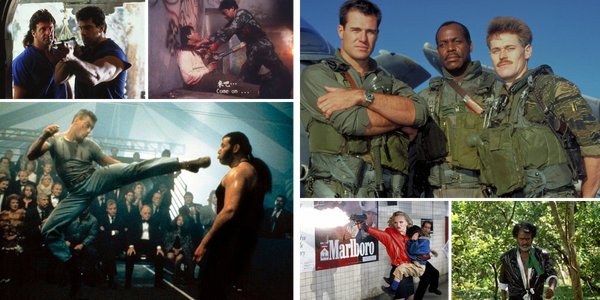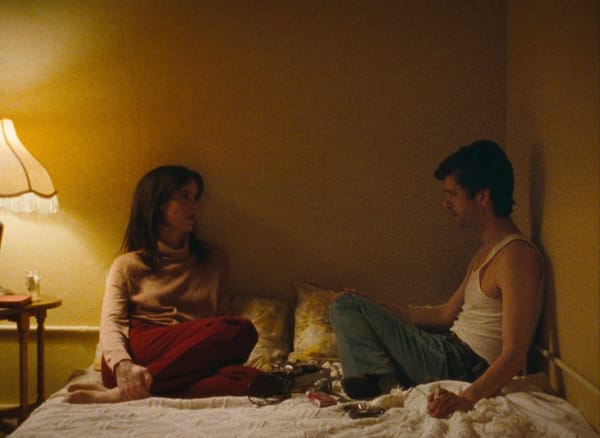Polygon Exit Interview: Cameron Faulkner, Commerce Editor
“Every day was full of new experiences”

Welcome to Polygon Exit Interviews, a series of chats with my excellent former Polygon employees who were laid off (along with me) when Valnet purchased the website from Vox Media May 1. We’re talking about how these talented people got to Polygon, what they did in their time there, and what they hope is next.
Next up: Cameron Faulkner, who along with Alice Jovanée, moved from The Verge to bolster Polygon’s commerce program, recommending tech, gaming, and entertainment deals. A hardware expert with great taste in media, Cameron was a very valuable addition to the Polygon team who ran a successful commerce program that encouraged genuine and natural enthusiasm about the items and titles that were recommended by staff members.
PV Guide is a reader-supported publication. To receive new posts and support my work, consider becoming a free or paid subscriber.
This interview has been lightly edited for length and clarity.
Tell me about your pre-Polygon background.
Right before I got to Polygon, I worked at The Verge on the commerce team, much like I ended up being on at Polygon. But I had wanted to work at Polygon for a little while, and so I set up a meeting with [former Polygon executive editor] Chelsea Stark. I was just like, Hey, I'd like to pick your brain about if a job ever opens up at Polygon to do a similar role to what I have over at The Verge. She was gracious enough to give me 30 minutes of her time, and I just pitched myself. We stayed in touch. It was cool to finally know someone over there, because the only exposure at The Verge I had to Polygon was that there was this long-running Smash Bros feud, and that Polygon sucked at Smash Bros., apparently, but I never believed it.
That was in September 2022, and then randomly in early January 2023, I got an offer to come over as the commerce editor. I pretended to hesitate, just to make people feel like I was really deliberating [laughs]. But I was like, Hell yeah, let's go. That was my direct pre-Polygon background. But before that, I worked at a site called Tech Radar that is really big in parts of Europe, and I reviewed smartphones and stuff like that.
What was it about Polygon that made you want to work there?
The Verge also covers gaming, but it wouldn't really dive into it in the same way. That's mostly because of staffing, not ambition. It was clear to me how many more sectors of entertainment exist out there. It wasn’t my first exposure to it, but it was like, Wow. Vox Media has a brand that explores tabletop gaming, film, TV, and anime? This sounds too good to be true. And so it was really cool. I felt that way when I worked there, constantly challenging myself to find new ways to dig into these kinds of entertainment that I had. Everyone has their first exposure to, like, anime or tabletop. I just constantly felt like every day was full of new experiences and new exposures.
What do you remember about first joining?
The team being so small, yet so efficient and so ambitious.
Also I remember my early meetings with Polygon leadership. It wasn't like, Hopefully we hit goals. It was, We have to hit goals, how can I help you? How can I help to remove roadblocks so that you can hit goals? That was a very cool indicator of how serious the team were at doing a good job and getting things in front of Polygon readers that we thought were cool, but also the same kind of editorial rigor was there. We weren’t going to just put things in front of people's faces just because. We said no to many, many posts, because it didn't fit, or we didn't have the manpower, so to speak, to juggle that much.
It was also my first time leading a section. So that was very intimidating, because I had more agency in deciding what goes up on the site. When pre-orders come out, do we hit them? How far into the future are we looking? What kind of products are we tackling? It was all for us to decide, and it was something that we hadn't figured out yet and were constantly refining. I was putting a lot of pressure on myself to get it right. But it was impossible to get right. Just like every other section, I imagine, we were kind of always building the thing as it's going down the freeway.
How would you describe the strategy you settled on, and how you wanted the commerce program to feel?
I had certain things that I was interested in that I figured others might be interested in as well. I've always been into gaming accessories, high end monitors, and things like that. But the guiding light for me, to reach new levels of authenticity, was to find what the people who worked at the site liked. It was about finding the authority on the site who had passion for something.
It was always kind of funny to be like, Well, do you want to write a deal post? Because that's never what anyone wanted to hear. But ultimately, as people started to get to know me and understand my expectations, I really just wanted them to put their feelings on the page. Whether someone bought it or not wasn't really the point, even though that was the point, you know what I mean? Like, we would put the necessary furniture on the page. But the most important thing for me was building a connection with people, so that it wasn't annoying when I would knock on their door. Sometimes the person with the authority was busy, but just being able to lean on their foundation of knowledge and passion, it's infectious. You can build something off of that, like point readers to other articles, of which there were many on so many topics.
Brag about yourself: what’s one thing you’re proud of from your time at Polygon?
Looking back, I really think the thing that I'm happiest about is that I got to know so many people. I feel like I got to be enmeshed in the Polygon culture. It was a really special place, and that is my biggest takeaway.
We were also profitable. It was an important part of my job. And Zelda: Tears of the Kingdom was like the flagship just blasting through it. So that felt really good. And okay, I will brag about myself for spearheading the commerce team with basically one other writer, Alice, who was doing just as much, if not more, in other departments. I leaned on her for tabletop knowledge, Warhammer 40k, and so much more. I tried to learn, but there was no way I could catch up to the extent of someone who is totally invested and has that kind of passion. But yeah, being a part of a two-person team that smashed goals all the time felt really damn good. We were the #2 Vox Media site in terms of affiliate revenue, which was cool.
Everyone pitched in across sections at Polygon. What’s a time where you did something outside of your core job responsibilities that you enjoyed?
I got to review stuff, which was fun. Reviewing products was something that I did a lot of at The Verge and being able to flex an old skill felt good. It ended up being a core part of my day-to day at Polygon. Writing about the best steam deck accessories required me to be able to call something in and assess its quality and determine whether we want to share it with readers. But, you know, going hands on with products like headsets and high end monitors was something that had kind of fallen by the wayside at Polygon. There were a lot of efforts with curation and games and software, those were all handled pretty well. It was the other stuff, like anything outside of a console, things that were more ancillary to the experience, but that a lot of people were interested in and passionate about. That felt like my way of contributing to some of the niche subcultures that were on Polygon.
Do you have a favorite Polygon story or video by someone else?
One article has popped into my mind a couple times the past few weeks. The new Avatar trailer came out, and I was reminded of this article that Petrana Radulovic did that broke down when in Avatar: Way of the Water you should get up to pee. There's so much water sound effects in the movie, and there are so many down points, and it's long. I had the luxury of watching it at home, and I had it up to follow its wisdom whenever I wanted. That's just like the perfect example of a post that wouldn't exist elsewhere.
As a hardware expert, what’s the best upgrade you’ve made to your home work or entertainment space?
I think the best upgrade that I've made is an OLED TV, and I did not spend a ton of money on it, and I don't think that I could have justified or convinced my wife to let me do it. A former colleague sold me his lightly used, second hand model. I think everyone who pays even the slightest bit of attention or has a relatively new smartphone with a nice screen knows that they're the best out there in terms of vivid picture quality. And as people in the tech industry like to say, per pixel, light, luminance, control, that kind of thing. I don't care that my entertainment center is falling apart, or that my sound bar kind of sucks. I'm a visual person, so all the other stuff kind of falls to the wayside a little bit. But I have not made upgrades like that in my office, there's just something that feels wrong about spending so much personal money on something that I would mostly use for work.
What do you think is the biggest misconception that people outside the industry have about games journalism?
Something I've seen appear in comments on a lot of my work, as well as the work of others, is this assumption that there is undisclosed bribery taking place. That the reason the article exists is at the behest of the company who distributed the products, and that coverage is only based upon what the publication gets out of it. You could go down a bunch of rabbit holes about the challenges of discoverability and the difficulties game developers have with getting their titles noticed. But with all of the past shit shows the games media industry has had to endure, like GamerGate and all of that and the distrust in media generally – and I think you should question wherever you get your information – but to just immediately doubt the veracity of the content that you're reading, especially if it’s someone who thinks Polygon just has a blanket agenda of “loving Xbox” or something, that’s so funny to me.
Clayton [Ashley] brought this up as well, especially within the context of YouTubers and streamers and influencers not necessarily having to live up to the same ethical standards that an organization like Polygon had. If there is some sort of sponsorship or some sort of money exchanging hands, it has to be disclosed. And if it isn't disclosed, it's not happening.
That was a big part of the affiliate side of things for us. It's so important that it's built into the code in the CMS that the FTC requires disclosure that you might make money off of people purchasing things in the article. Other things should be disclosed too, if they’re applicable, like conflicts of interest. Obviously, a lot of websites have that all to quash any kind of suspicion that there's foul play, you know. But that doesn't stop people from lobbing really unfair treatment to a lot of writers. So yeah, I guess that's probably the biggest misconception. What actually happens behind the scenes is not as nefarious as you may expect. It's actually rather boring.
What’s your wish for the future of games journalism or digital media?
I wish that there was just a fund of money out there for people, especially those who aren't attached to cash-flush publications, to just be able to pursue covering these really important industries. Because without games media, film media, tabletop media, these companies have no way to reach the people who they want to reach without the media serving as like a liaison of taste and curation, to filter out the crap and bring the good stuff to the top. Money, unfortunately, makes the world go round, and it's the thing that we all need to survive and to do our best work. And so I just wish that, I wish that there was enough money to go around.
What’s next for you?
I was offered a lateral move to stay at Vox Media, so I’m now a commerce editor at The Verge. I’m doing my best work, and I am lucky to be able to go back.
[The sale of Polygon] is all still very strange and confusing. What I'm not confused about is how confident I felt in all of our work every day. Whenever someone would highlight the homepage, I would just feel like, That's a fucking homepage, look at all of that stuff. I've never seen another site that looks like that. And I was so proud to work there. Some of the highest points in my career, just full stop. There are so many people who have been affected by layoffs and just career alterations. I don't have a complete window into that, because I was one of a few people who was lucky enough to be given an opportunity to stay, but I can only imagine what it's like, for people in your position and so many others.
My life has also been worse off without all of the recommendations, the conversations. I'm not privy to so much that is happening anymore. It's definitely a loss. When the sale happened, it's like when you see the videos online of huge glaciers breaking away and falling and creating a huge splash. That huge glacier represents so much institutional knowledge and essential viewpoints on industries.
Where can people follow you and your work?
I’m on Bluesky, and you can find my work at The Verge on my profile there.
PV Guide is a reader-supported publication. To receive new posts and support my work, consider becoming a free or paid subscriber.




